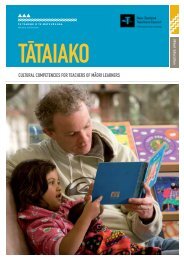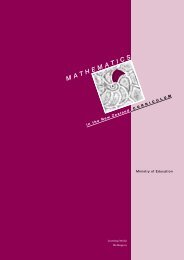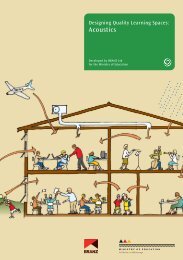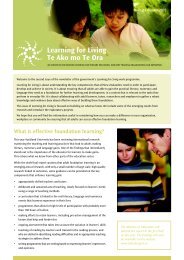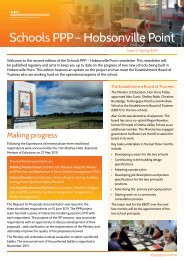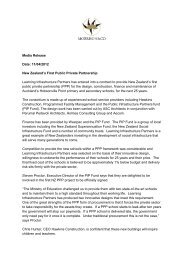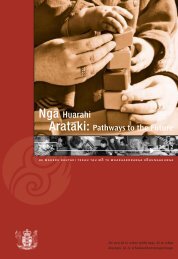values in the new zealand curriculum - Ministry of Education
values in the new zealand curriculum - Ministry of Education
values in the new zealand curriculum - Ministry of Education
Create successful ePaper yourself
Turn your PDF publications into a flip-book with our unique Google optimized e-Paper software.
K<strong>in</strong>g (2003) attempts to fill <strong>in</strong> some <strong>of</strong> <strong>the</strong> gaps. He notes that a number <strong>of</strong> aspects <strong>of</strong> New<br />
Zealand culture l<strong>in</strong>ked to <strong>the</strong> attitudes and <strong>values</strong> <strong>of</strong> <strong>the</strong> early Pākehā settlers are still<br />
evident <strong>in</strong> <strong>the</strong> present. He <strong>in</strong>cludes <strong>in</strong> this <strong>the</strong> notion that <strong>the</strong> country is special, and has<br />
features that <strong>the</strong> rest <strong>of</strong> <strong>the</strong> world could learn from - New Zealand as “God's own”. The<br />
man alone ideal, and <strong>the</strong> hunt<strong>in</strong>g-shoot<strong>in</strong>g-fish<strong>in</strong>g ethic is strong. Bach culture based on<br />
“a strong desire to live simply on <strong>the</strong> marg<strong>in</strong> between land and sea,” is a feature <strong>of</strong> New<br />
Zealand. The highly practical “do-it-yourself tradition <strong>of</strong> home ma<strong>in</strong>tenance” lives on.<br />
There is, what K<strong>in</strong>g calls a “fiercely egalitarian <strong>in</strong>st<strong>in</strong>ct” <strong>in</strong> Pākehā New Zealand, which<br />
prefers to see resources spread widely and equitably through <strong>the</strong> community. There is<br />
also, he suggests, an acceptance <strong>of</strong> strong reactions from dissent<strong>in</strong>g <strong>in</strong>dividuals or groups<br />
<strong>in</strong> <strong>the</strong> face <strong>of</strong> authority. He also identifies a strong preference for <strong>in</strong>formality at social<br />
occasions and <strong>in</strong> social situations (K<strong>in</strong>g, 2003, pp. 508-09).<br />
K<strong>in</strong>g fur<strong>the</strong>r argues that Pākehā New Zealanders value discretion and tact and do not<br />
approve <strong>of</strong> talk<strong>in</strong>g loudly and a long about one's own affairs and exploits. They th<strong>in</strong>k it is<br />
important to be able to take a h<strong>in</strong>t and sense an attitude as much from what is not said, as<br />
from what is. He po<strong>in</strong>ts out that Pākehā New Zealand heroes and hero<strong>in</strong>es epitomise<br />
modesty, do<strong>in</strong>g practical good <strong>in</strong> <strong>the</strong> world, support <strong>of</strong> humanitarian and conservation<br />
causes, be<strong>in</strong>g reticent, strong, dependable, unboastful, good-humoured, and accept<strong>in</strong>g<br />
responsibility quietly with patience and grace (K<strong>in</strong>g, 2003, pp. 509-510).<br />
One essential <strong>in</strong>gredient <strong>of</strong> Pākehā-ness, for K<strong>in</strong>g, is <strong>the</strong> acceptance <strong>of</strong> <strong>the</strong> worth <strong>of</strong> th<strong>in</strong>gs<br />
Māori and be<strong>in</strong>g affected by Māori th<strong>in</strong>gs such as Māori concepts, <strong>values</strong>, language and<br />
relationships. K<strong>in</strong>g claims that more than 160 years <strong>of</strong> work<strong>in</strong>g toge<strong>the</strong>r around <strong>the</strong> Treaty<br />
<strong>of</strong> Waitangi, particularly over <strong>the</strong> last 25 years, has resulted <strong>in</strong> what might be called a<br />
“mutuality <strong>of</strong> respect.” He claims that both cultures have borrowed richly from each o<strong>the</strong>r<br />
and that Pākehā culture has changed some <strong>of</strong> <strong>the</strong> features <strong>of</strong> its European and Western<br />
cultural orig<strong>in</strong>. He gives examples such as <strong>the</strong> wide acceptance <strong>of</strong> words and concepts<br />
such as mana, tapu, whānau, taonga, haka, turanagawaewae and attitudes such as <strong>the</strong><br />
tradition <strong>of</strong> hospitality (manaakitanga). He suggests that ways <strong>of</strong> do<strong>in</strong>g bus<strong>in</strong>ess and<br />
conduct<strong>in</strong>g affairs <strong>in</strong> New Zealand show an <strong>in</strong>crease <strong>in</strong> <strong>the</strong> will<strong>in</strong>gness to talk issues<br />
through and reach consensus <strong>in</strong> preference to divid<strong>in</strong>g <strong>in</strong>to groups for and aga<strong>in</strong>st a given<br />
motion, (Hui and Kotahitanga). He also suggests that rites <strong>of</strong> passage have changed,<br />
Values <strong>in</strong> <strong>the</strong> New Zealand Curriculum: A Literature Review 15



